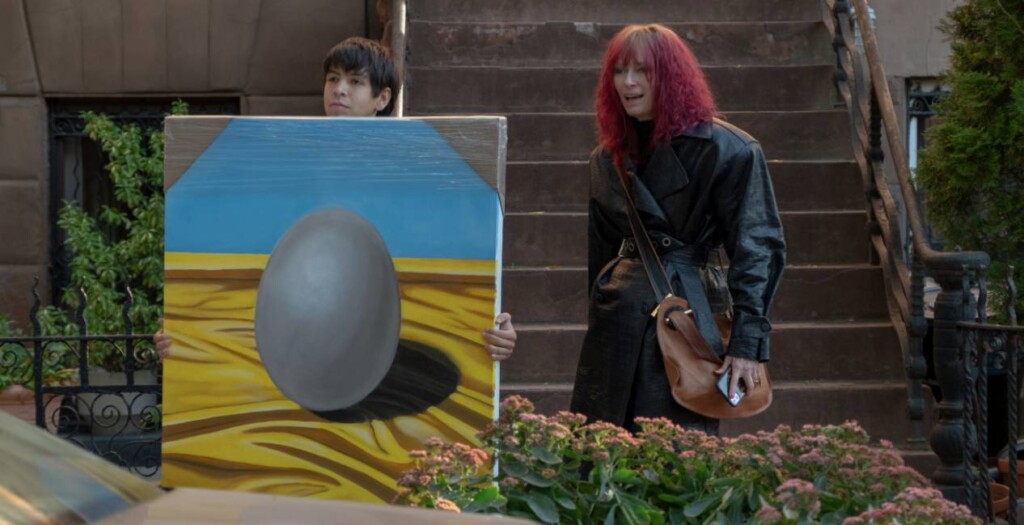Having first fallen in love with Julio Torres’ work on Los Espookys, I thought I knew what to expect from the comedian’s directorial debut Problemista. Released by A24, the film’s trailer offered a pastel New York with the right amount of weird humor I had come to associate with the writer-director after his work for the HBO series. But when the time came to actually watch Problemista, it was well beyond what I thought.
The film follows soft-spoken Alejandro, an aspiring toy designer from El Salvador. After being denied by Hasbro for his extremely unusual toy ideas, he has to find a new pathway to a work visa. To survive the New York City rent, he gets a job at a cryogenics lab that is technically euthanasia that keeps bodies on ice until they can eventually be thawed out and cured of whatever ailment they had. But when his time on his work visa runs out, he winds up taking a job assisting an erratic art-world outcast, Elizabeth (Tilda Swinton). A woman collecting portraits of eggs by her late husband (RZA) to put on one last show, she is his only hope to stay in the country and realize his dream. Only, she’s more dragon than woman when it comes to getting things done her way.
Torres’s approach to building Alejandro’s resiliency is thoughtful and authentic. At first, Ale has the privilege of not raising hell. He’s quiet, doesn’t send food back, and doesn’t push back on anyone or advocate for himself. But as his circumstances grow more dire and the shifting sands of time start to run out, he doesn’t have that luxury. Instead, he has to be harsh. He fights for others to listen. But in it all, Alejandro doesn’t lose his whimsical view of the world.
Whether it was Torres’ intention or not, he’s told a powerful immigrant story that shows that you don’t sacrifice yourself to gain what you deserve. As Alejandro learns to face conflict head-on, his love of color, his soft tone, and even the way he softly walks from place to place are never thrown away. He maintains his vulnerability, and New York remains a whimsical place—only now, he gets things done.
It’s not often that we see a story that doesn’t try to chip away at a character’s softness. Particularly, as they move through hardship. Alejandro grows throughout Problemista, but his determination is because of his creative and fantastical eye, not despite it. As a protagonist, Ale presents audiences, especially Latino audiences, with an alternative to the battle-hardened survivor many of us are forced to be. Or rather, he changes what that can look like. Alejandro isn’t without his scars; they’ve only healed like shimmering cracks in Kintsugi pottery.
A lot of this is thanks to the strength of the women in Alejandro’s life. His mother is kind and loving. She wants to make his world perfect even if the $40 she offers to overnight a burned CD is hundreds of dollars short of what is needed. Still, she tries. His mother is his rock.
On the other hand, the cold and brash Elizabeth is a dragon fighting everyone who inconveniences her, even Alejandro. But in her way, she loves him. Through her grit and anger, she also teaches Alejandro how to demand to speak to the manager and get things done. Or rather, not to be afraid to do so. She is a mess. She doesn’t always know how to treat those she loves with the kindness they deserve, but her anger is a salve for her loneliness.

Julio Torres’ approach to his characters is monumental. However, it’s his use of practical effects that truly makes Problemista achieve the great heights that it does. The attention to creating beautiful, whimsical, and worn sets is fantastic. From visualizing the cesspool that is Craigslist to the cave where he fights the evil dragon and even the sprinkling of magic among New York’s streets, all of it feels incredibly special. We are seeing the world the way Alejandro does. We see all of its ugliness but also all of its beauty, too.
The best use of set design, however, is the two visual representations of the immigration system and what it’s like to just get a work visa. On the surface, the exposition of the immigration process is straightforward. You need money to get a lawyer and file paperwork to start working. However, this paperwork needs a signature from a work sponsor. Oh, and they can’t pay you; otherwise, you’re breaking the law. But if you can’t legally make money to pay the fees, how can you get a paper for the sponsor to sign? And if you can’t work, how can you prove they can sponsor you? This winding maze traps Alejandro and every other immigrant like him.
Torres visualizes the US Immigration system as a room with a key that leads to other rooms through a vent. When Alejandro enters the vent, it puts him in an even further room. He loops and loops while the key and his visa remain out of reach. A room full of hourglasses with sand running out pairs hammers home the symbolism. With his name on one, Torres shows the audience what happens when the sand runs out. The immigrant disappears.
The artistic take on the immigration system doesn’t obfuscate any of the realities involved. Instead, Problemista presents the best explanation that everyone with questions should watch. Torres’ ability to capture the confusion in the reality of life with just the right amount of joy is something that no one can do. Humor isn’t the sugar to make the pill go down. Instead, it highlights how damn big the pill is.
Problemista is simple and weird. It’s whimsical and authentic. The film feels like Julio Torres is letting us into his life. Alejandro is an autobiographical character in many ways, but not just for Torres. He’s one for anyone who has had to navigate the immigration system alone. Only he doesn’t lose his joy or his smile. He doesn’t let anyone, not even the dragon, steal that.
Problemista is playing now in select theaters.
Problemista
-
Rating - 9.5/109.5/10
TL;DR
Problemista is simple and weird. It’s whimsical and authentic. The film feels like Julio Torres is letting us into his life. Alejandro is an autobiographical character in many ways, but not just for Torres.







